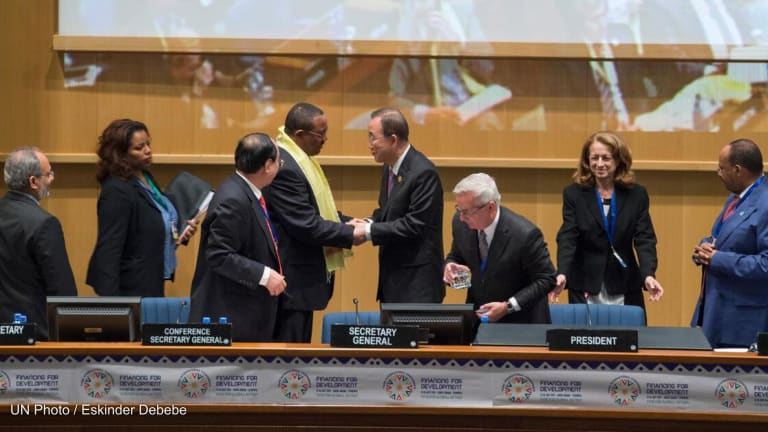A Q&A with the woman who helped shape the Sevilla Platform for Action
After countries signed off on the draft outcome document for the FfD4, UNDESA official Shari Spiegel lays out what’s left to do in Sevilla.
As nations prepare for the Fourth International Conference on Financing for Development, or FfD4, in Sevilla, Spain, this month, Shari Spiegel is a central figure to watch. As director of the Financing for Sustainable Development Office at the U.N. Department of Economic and Social Affairs, or UNDESA, Spiegel has helped shape the outcome document that countries agreed to this week. With momentum now shifting toward Spain, Spiegel spoke with Devex about what to expect from Sevilla, how key issues such as debt and climate finance are being handled, and why the absence of the United States doesn’t spell the end of multilateral ambition. This interview has been condensed and edited for clarity. Nations agreed to a draft of the Fourth Financing for Development outcome document this week, so what can we expect from discussions in Sevilla? What is left to do? Sevilla is not an ending point; it’s a starting point, and it’s a starting point for implementing a new framework and new ways of thinking about how to get some of the financing back on track. This is the start of the next phase, to all come together, to show support, to highlight the issues, and then to start working together on how we’re going to implement it. Will what happens in Sevilla change anything about the final text that nations have already agreed to? The document will again be ratified in Sevilla, but the view is that most every country will take the same position they took [in New York], so that shouldn’t be a big deal. And then we’re really on to the question of implementation. The Business Forum will be an opportunity for businesses to think through how to move things forward. We really think of the conference as a time to celebrate the agreement, to bring attention to it, and then also to start to move into the next phase. Several countries expressed disappointment with the final outcome document, specifically on debt and climate. How effective do you think the final draft is going to be in moving these issues forward? On climate, there was a feeling that the big climate negotiations should happen in the [United Nations Framework Convention on Climate Change], and so the goal here wasn’t to replicate that. That being said, FfD is relevant to climate action. And so many of the actions and issues are very, very relevant to the financing of the Baku-to-Belém road map. And so I do think that over time, the synergies will continue to grow. There was agreement to institutionalize a lot of the ongoing work [on debt] and to have some sort of a facility — basically a strengthened facility that can offer debt swaps and other instruments to countries to lower the cost of capital. It’s great that these instruments are being used, but we really need to coordinate across the system. We need to share knowledge, and we need resources to help countries to better manage their liquidity using tools such as debt swaps. And then for when defaults do happen. How do countries restructure? What about the debt architecture? There are a lot of efforts on the G20 common framework, including calling for an expansion of coordinated debt treatments to countries not covered by the current initiatives. A big complaint that we heard is that the G20 framework is quite slow and opaque. Are there changes in the document that are addressing those concerns? If you look at the text that was agreed to, it talks about a predictable, timely, orderly, and coordinated process. And then it actually calls for temporary suspensions of debt service by borrowing countries during negotiations, and a guide for borrowing countries on indicative timelines and main steps for debt treatment. I think that one of the things that came out of the discussions was a real acknowledgment and realization that developing countries and borrower countries have very little voice in the global debt architecture. And so the outcome also calls for both a “borrowers’ club,” or a coalition of borrowing countries, and for a process at the United Nations that includes a dialogue with the Paris Club, the IMF, the World Bank, and private creditors and other creditors. The U.S. has pulled out of FfD4. What is the fallout from this likely to be? There are a lot of actions across the document, not just debt. It’s true that some of these actions need the U.S. as the major shareholder in some of the [international financial institutions], so there are actions that do need the U.S. participation in the end. Part of these documents is to get the dialogue started. But at the same time, there are a lot of actions that are already going to be implemented. The Seville Platform for Action, which Spain is putting forward along with UNDESA, is bringing together coalitions of countries and development banks, and other actors that are already committing and putting forward initiatives to start implementing much of the document. But FfD is really meant to capture the zeitgeist of development. What does it mean for the U.S. to not be part of that? It is what it is. The world is coming together. Of course, it’s always great to have the biggest economy in the world be part of the discussions, but the rest of the world wants to come together to move this forward and to make an agreement. I’m sure there are elements in there that the U.S. isn’t against. And as I said, many countries are going to move it forward.
As nations prepare for the Fourth International Conference on Financing for Development, or FfD4, in Sevilla, Spain, this month, Shari Spiegel is a central figure to watch. As director of the Financing for Sustainable Development Office at the U.N. Department of Economic and Social Affairs, or UNDESA, Spiegel has helped shape the outcome document that countries agreed to this week.
With momentum now shifting toward Spain, Spiegel spoke with Devex about what to expect from Sevilla, how key issues such as debt and climate finance are being handled, and why the absence of the United States doesn’t spell the end of multilateral ambition.
This interview has been condensed and edited for clarity.
This story is forDevex Promembers
Unlock this story now with a 15-day free trial of Devex Pro.
With a Devex Pro subscription you'll get access to deeper analysis and exclusive insights from our reporters and analysts.
Start my free trialRequest a group subscription Printing articles to share with others is a breach of our terms and conditions and copyright policy. Please use the sharing options on the left side of the article. Devex Pro members may share up to 10 articles per month using the Pro share tool ( ).
Jesse Chase-Lubitz covers climate change and multilateral development banks for Devex. She previously worked at Nature Magazine, where she received a Pulitzer grant for an investigation into land reclamation. She has written for outlets such as Al Jazeera, Bloomberg, the Organized Crime and Corruption Reporting Project, and The Japan Times, among others. Jesse holds a master’s degree in Environmental Policy and Regulation from the London School of Economics.




